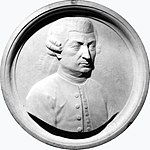Giovanni Arduino
Giovanni Arduino | |
|---|---|
 | |
| Born | 16 October 1714 |
| Died | 21 March 1795 (aged 80) |
| Nationality | Italian |
| Known for | Italian Geology |
| Scientific career | |
| Fields | Geology |
Giovanni Arduino (16 October 1714 – 21 March 1795) was an Italian geologist who is known as the "Father of Italian Geology".
Arduino was born at Caprino Veronese, Veneto. He was a mining specialist who developed possibly the first classification of geological time, based on study of the geology of northern Italy. He divided the history of the Earth into three periods: Primitive, Secondary, and Tertiary.

The scheme proposed by Arduino in 1759,[1][2] which was based on much study of rocks of the southern Alps, grouped the rocks into four series. These were (in addition to the Volcanic or Quaternary) as follows: the Primary series, which consisted of schists from the core of the mountains; the Secondary, which consisted of the hard sedimentary rocks on the mountain flanks; and the Tertiary, which consisted of the less hardened sedimentary rocks of the foothills. Because this arrangement did not always hold true for mountain ranges other than the Alps, the Primary and the Secondary were dropped in the general case. However, the term 'Tertiary' has persisted in geological literature until its recent replacement by the Palaeogene and Neogene periods. The last period of the Cenozoic Era is still known as the Quaternary period. The Cenozoic was studied and further determined by, among others, the English geologist (and mentor of Charles Darwin) Charles Lyell.[1]
Giovanni Arduino died in Venice in 1795. The lunar ridge Dorsum Arduino is named after him.
Further reading
[edit]- Rodolico, Francesco (1970). "Giovanni Arduino". Dictionary of Scientific Biography. Vol. 1. New York: Charles Scribner's Sons. pp. 233–234. ISBN 0-684-10114-9.
- Ell, Theodore (2011). "Two Letters of Signor Giovanni Arduino, Concerning his Natural Observations: First Full English Translation. Part 1". Earth Sciences History. 30 (2): 267–286. Bibcode:2011ESHis..30..267E. doi:10.17704/eshi.30.2.22r632j0x453gj45.
References
[edit]- ^ a b Bates, Marston (1950). The Nature of Natural History. New York: Charles Scribner's Sons. p. 51.
- ^ See:
- Arduino, Giovanni (1760). "Lettera Segonda di Giovanni Arduino … sopra varie sue osservazioni fatte in diverse parti del territorio di Vicenza, ed altrove, apparenenti alla Teoria terrestre, ed alla Mineralogia" [Second letter of Giovani Arduino … on his various observations made in different parts of the territory of Vincenza, and elsewhere, concerning the theory of the earth and mineralogy]. Nuova Raccolta d'Opuscoli Scientifici e Filologici [New collection of scientific and philogical pamphlets] (in Italian). 6: 133 (cxxxiii)–180(clxxx). Available at: Museo Galileo (Florence (Firenze), Italy) From p. 158 (clviii): "Per quanto ho potuto sinora osservavare, la serie di questi strati, che compongono la corteccia visibile della terra, mi pare distinta in quattro ordini generali, e successivi, senza considerarvi il mare." (As far as I have been able to observe, the series of these layers that compose the visible crust of the earth seems to me distinct in four general orders, and successive, not considering the sea.)
- English translation: Ell, Theodore (2012). "Two letters of Signor Giovanni Arduino, concerning his natural observations: first full English translation. Part 2". Earth Sciences History. 31 (2): 168–192. Bibcode:2012ESHis..31..168E. doi:10.17704/eshi.31.2.c2q4076006wn7751.
External links
[edit]- Effetti di Antichissimi Estinti Vulcani, e Altri Fenomeni, e Prodotti Fossili Osservati da Giovanni Arduino Archived 2015-07-02 at the Wayback Machine (1769); Osservazioni chimiche sopra alcuni fossili Archived 2016-03-12 at the Wayback Machine (1779); and Esame Chimico, e Considerazioni Sopra la Marga, Ossia Marna... Archived 2016-03-07 at the Wayback Machine (1791)- full digital facsimiles at Linda Hall Library
